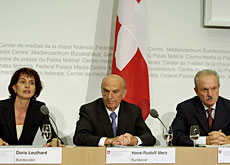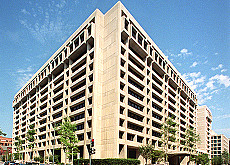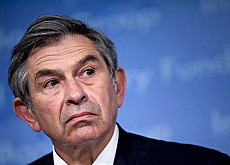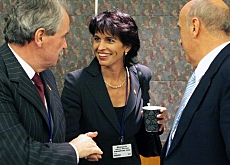Swiss IMF seat on shaky ground

The International Monetary Fund (IMF) is carrying out a reform of its quota and voting rights system that may well reduce Swiss influence in the institution.
The governance reform aims to overhaul the representation of members to reflect recent changes in the global economy, enhancing the participation and voice of poorer nations. But this may ultimately cost Switzerland its seat on the Executive Board.
The meeting of the Boards of Governors of the IMF and World Bank this weekend in Washington is therefore taking on ever-greater importance for the Swiss.
Since joining the IMF in 1992, Switzerland has had a seat on the Executive Board and by extension the World Bank boards as well.
As the head of a voting group which comprises Poland, Serbia and the ex-Soviet republics of Azerbaijan, Tajikistan, Turkmenistan, Uzbekistan and Kyrgyzstan, Switzerland holds one of the 24 seats.
But Switzerland’s prospects of holding on to this position in the long term are doubtful. The quota reform is designed to boost the representation of the developing and emerging countries at the expense of the industrialised nations.
New face
Former French finance minister Dominique Strauss-Kahn will take over as the new head of the IMF at the end of October.
Strauss-Kahn has said he intends to press ahead with IMF reform, arguing that the institution that oversees the global economy must adapt to stay relevant in a globalized world.
According to the Swiss representative with the IMF, Thomas Moser, it is already clear that the new quota calculation formula will disadvantage developed European countries. The weight given to foreign currency reserves and external trade will be decreased.
Countries like Belgium and Switzerland, which have strong external trade and rich gold and foreign currency reserves, will be particularly affected.
The new formula will give greater weight to gross domestic product (GDP) instead. Switzerland is not thrilled by this new development but has no options to block it.
Calculating quotas
It has already been established that GDP will not exclusively be calculated on the market rate, but that Purchasing Power Parity (PPP) will be taken into account. This is a method of measuring the relative purchasing power of different countries’ currencies over the same types of goods and services.
This favours developing countries where the cost of living is much lower and purchasing power is therefore higher. With GDP figures based on the market rate alone, the United States would come out with a higher quota than any of the emerging nations, which would be considered unacceptable across the board.
How exactly PPP/GDP will be calculated remains open. Switzerland’s quota could end up at the same level as countries like Vietnam. The Swiss seat is not in danger in the first round of reform. But in the longer term it could be difficult for Switzerland to keep its seat when the quotas of Russia, Brazil, India and other emerging countries are strongly boosted.
In Bern thoughts are already turning to which additional countries Switzerland could attract into its group. One potential candidate would be Turkey, otherwise Norway or Ukraine.
But even if it is possible to reinforce the Swiss group on time, it is debatable whether Switzerland would be the uncontested leader of the group.
swissinfo, Luzian Caspar in Washington
Quota subscriptions generate most of the IMF’s financial resources. Each member country of the IMF is assigned a quota, based broadly on its relative size in the world economy.
A member’s quota determines its maximum financial commitment to the IMF and its voting power, and has a bearing on its access to IMF financing.
The US has the largest quota of the 24 members of the Executive Board at 17.08 per cent. Germany and France have close to 6 and 5 per cent respectively, while Switzerland and Poland share a 2.84 per cent quota.
The IMF’s reform plans met with Swiss scepticism, Finance Minister Hans-Rudolf Merz told a news conference this week.
At the next IMF meeting in Washington, Merz and Swiss National Bank Director Jean-Pierre Roth will push for the openness of the economy and the significance of the financial centre to be taken into account in the reallocation of quotas.
Switzerland is generally positive towards a reorientation of World Bank strategy, Economics Minister Doris Leuthard told the news conference. The changes would be necessary due to changes in the world economy, she said.

In compliance with the JTI standards
More: SWI swissinfo.ch certified by the Journalism Trust Initiative



You can find an overview of ongoing debates with our journalists here. Please join us!
If you want to start a conversation about a topic raised in this article or want to report factual errors, email us at english@swissinfo.ch.